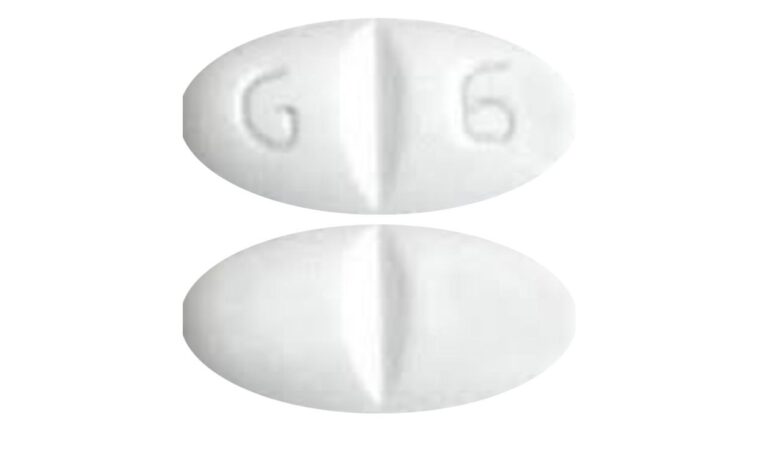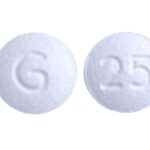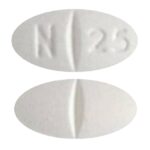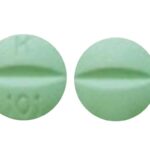G 6 Pill: Uses, Dosage, High, Side Effects, Warnings

The white, elliptical / oval pill with imprint G 6 has been identified as Gabapentin 600 mg supplied by Ascend Laboratories, LLC. Gabapentin is an anticonvulsant medication that helps control seizures in people with epilepsy. G 6 pill appears to work by altering electrical activity in the brain and influencing the activity of chemicals called neurotransmitters, which send messages between nerve cells.
G 6 pill can also help reduce post-herpetic neuralgia, which refers to a burning or stabbing nerve pain that is a common complication of shingles. According to one 2017 review, oral gabapentin can reduce moderate or severe nerve pain that results from shingles or diabetes at a minimum daily dosage of 1,200 milligrams.
A 2016 study also suggests that gabapentin combined with oxycontin, which is an opioid pain reliever, can help control pain and increase the quality of life for people with severe cancer pain. However, doctors do not typically prescribe gabapentin for this purpose.
How should I take G 6 pill?
The gabapentin dosage your doctor prescribes will depend on several factors. These include:
- the type and severity of the condition you’re using gabapentin to treat
- your age
- the form of gabapentin you take
- other medical conditions you may have
Typically, your doctor will start you on a low dosage and adjust it over time to reach the dosage that’s right for you. They’ll ultimately prescribe the smallest dosage that provides the desired effect.
The following information describes dosages that are commonly used or recommended. However, be sure to take the dosage your doctor prescribes for you. Your doctor will determine the best dosage to suit your needs.
Gabapentin can produce feelings of relaxation, calmness and euphoria. Some users have reported that the high from snorted gabapentin can be similar to taking a stimulant. It can also enhance the euphoric effects of other drugs, like heroin and other opioids, and is likely to increase the risks when taken in this way.
What are the side effects of G 6 pill?
Gabapentin can cause mild side effects. According to the 2017 review, these effects were slightly more common in people taking gabapentin than a placebo.
The most common side effects, occurring in around 10% of participants taking gabapentin, were:
• dizziness
• sleepiness
• water retention, which refers to swelling of the arms, hands, legs, and feet
• difficulty walking
Children and older adults may be more susceptible to adverse reactions associated with gabapentin.
Some other possible side effects include:
• back or chest pain
• constipation
• diarrhea
• vomiting
• upset stomach
• increased appetite and weight gain
• blurry vision
• bruising
• changes in mood
• chills
• a cough
• fatigue
• fever
• flu-like or cold-like symptoms
• hoarseness and dry mouth
• memory loss
• mouth ulcers
• shortness of breath
• a sore throat and swollen glands
• trembling
• urinary problems
• weakness
• uncontrollable eye rolling
In children, some of the more common adverse reactions include:
• anxiety, depression, or other mood changes
• behavioral problems
• changes in performance at school
• hyperactivity
• a lack of concentration
Safety Information
G 6 pill comes with several warnings. Call your doctor if you start having more seizures or a different kind of seizure while taking this drug.
Drowsiness warning
G 6 pill can slow your thinking and motor skills and cause drowsiness and dizziness. It’s not known how long these effects last. You should not drive or use heavy machinery while taking this drug until you know how it affects you.
Depression warning
Using this drug increases your risk of suicidal thoughts and behavior. Talk to your doctor if you feel depressed or notice any changes in your mood or behavior. Also talk to your doctor if you are having thoughts of harming yourself, including suicide.
Multiorgan hypersensitivity/DRESS warning
This medication can cause multiorgan hypersensitivity. This is also known as a drug reaction with eosinophilia and systemic symptoms (DRESS). This syndrome can be life-threatening. Call your doctor right away if you have symptoms such as a rash, a fever, or swollen lymph nodes.
Allergy warning
Gabapentin can cause a severe allergic reaction. Symptoms can include:
• trouble breathing
• swelling of your throat or tongue
• hives
• rash
Don’t take this drug again if you have ever had an allergic reaction to it before. Taking it a second time after any allergic reaction to it could be fatal (cause death).
Alcohol interaction warning
Avoid drinking alcohol while taking G 6 pill. Gabapentin can cause sleepiness, and drinking alcohol can make you even sleepier. Alcohol can also make you more likely to feel dizzy and have trouble concentrating.
Severe breathing problems warning
Severe breathing problems can occur if you take gabapentin with opioids, such as oxycodone or hydrocodone. Taking gabapentin with an opioid increases your risk for sleepiness, breathing problems, and even death. You’re at higher risk if you already have breathing problems. Get help right away if breathing problems occur.
Warnings for people with certain health conditions
For people with epilepsy: Don’t stop taking G 6 pill suddenly. Doing this can increase your risk of having a condition called status epilepticus. This is a medical emergency during which short or long seizures occur for 30 minutes or more.
Gabapentin can cause problems in children aged 3–12 years who have epilepsy. It raises their risk of thought problems as well as behavioral problems, such as being hyper and acting hostile or restless.
For people with kidney problems: Your body processes this drug more slowly than normal. This may cause the drug to increase to dangerous levels in your body. Talk to your doctor about whether this drug is safe for you.
Warnings for other groups
For pregnant women: The use of G 6 pill has not been studied in humans during pregnancy. Research in animals has shown negative effects to the fetus when the mother takes the drug. However, animal studies don’t always predict the way humans would respond.
Talk to your doctor if you’re pregnant or planning to become pregnant. This drug should only be used if the potential benefit justifies the potential risk to the fetus. Call your doctor if you become pregnant while taking this drug.
If your doctor prescribes gabapentin for you while you’re pregnant, ask about the NAAED Pregnancy Registry. This registry tracks the effects of anti-seizure drugs on pregnancy. Information can be found at aedpregnancyregistry.org.
For women who are breastfeeding: Gabapentin may pass into breast milk and cause serious side effects in a breastfeeding child. Tell your doctor if you are breastfeeding. You should decide together if you should stop taking this drug or stop breastfeeding.
For seniors: Kidney function may decrease with age. You may process this drug more slowly than younger people. Your doctor may start you on a lowered dose so that too much of this drug does not build up in your body. Too much of the drug in your body can be dangerous.
For children: Gabapentin has not been studied in children for the management of postherpetic neuralgia. It should not be used in people younger than 18 years. This drug should not be used to treat partial seizures in children younger than 3 years.





